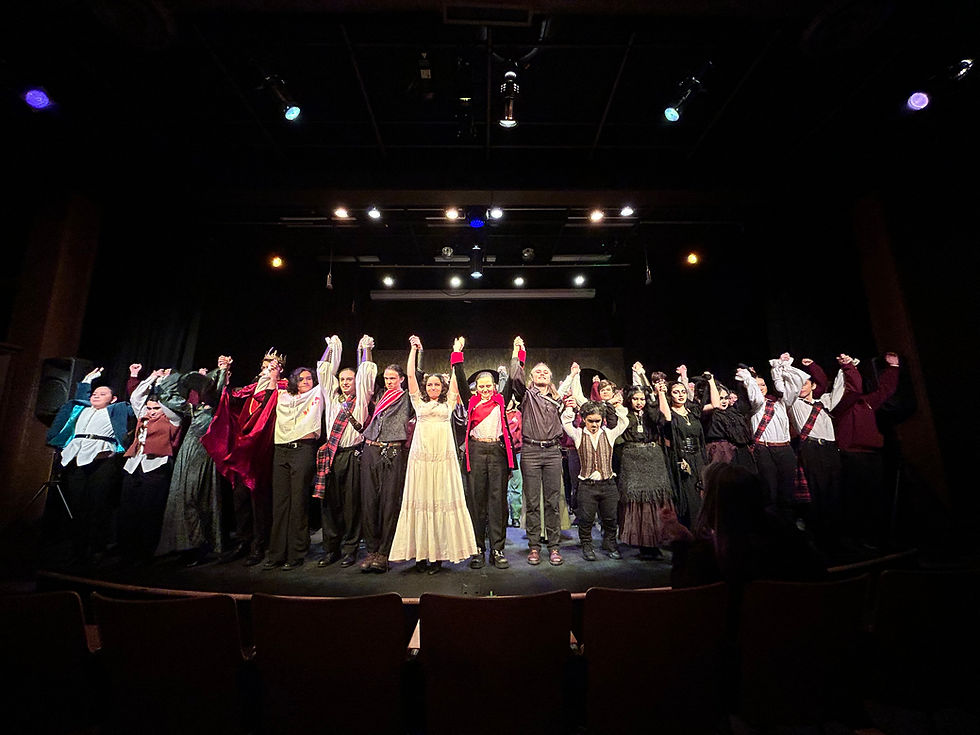











Moving acting choices, clever technical design, and a riveting fight scene: Sentinel Stage’s production of Macbeth was a chef d’oeuvre of student theatre, combining traditional Shakespearean performance with creative direction. From the centre of the third row, I was privy to every grimace, every wide-eyed cry, every clawed hand and bloodied knife. There was not a dull moment throughout the 2-hour-ish play; The Sentinel Sun spoke with a few students involved to discover how this Shakespeare classic was brought to life!

After the play, I caught up with Mackey Zhou, a grade 9 student and Set & Props Co-Manager. She described how the set we saw, the somber platform complete with three rounded arches, was reused from Sentinel’s production of Mamma Mia from two years ago! The pragmatic goal in the design process was to have a set behind which actors could hide during and between scenes. Aesthetically, dark colors and rough textures were employed to set the gloomy tone and to provide the backdrop of a medieval castle. Combined with the strategic lighting design that alternated between the purple darkness of the Macbeths’ minds and a warm yellow for the court, the design both mirrored and magnified the characters in this Shakespeare classic.
Lord and Lady Macbeth were portrayed vividly by Jake, grade 12, and Nona, grade 11; the cast overall delivered compelling interpretations of all the characters in Macbeth. I spoke with Saba Kazemeini, a grade 12 student, who portrayed one of the three Weyard Sisters; her immersion into her character was stunning! When asked about how she managed such a consistent physicality, she explained that her process began with understanding Shakespearean language. She noted that mentor and director Mike Stack offered her much inspiration, and was a great influence on her process, stating that she leaned very much into the notion of playing an elderly, shrivelled, yet very unique character— both vocally and physically.
Behind every great student production is a great student director; for Sentinel Stage’s Macbeth, this role was taken on by Lucine Tachdijian. “As director, your interpretation of the play is dependent on two things: your understanding of the script and your understanding of the actors you’re working with,” she told us, when asked about her responsibilities as director. Lucine looked to many silver-screen adaptations for inspiration, including the interpretations of Orson Welles, Roman Polanski, Akira Kurosawa and Joel Coen. “I filled my head with so many films that I sort of just stole what I liked from each,” she said. “Whatever storytelling choices each one made that I thought revealed the most of a character’s humanity-- no matter how reprehensible.”
A typical rehearsal with Director Lucine starts with the script: “I would always ask the actors to read over their lines together at the beginning of each rehearsal… Shakespearean verse is famously full of extended metaphors and references… For an actor, understanding the nuance behind his diction can be hugely beneficial.”
Lucine’s favourite part of the process was closing night: “Yes, it was a February Friday night in West Vancouver— and yes, it unfolded in a hot room infested with over 300 teenagers, parents and teachers sitting elbow-to-elbow on ancient auditorium chairs— but, for a brief moment, we were all wrapt in the hurly-burly of medieval Scotland.”

Sentinel Stage’s production of Macbeth was a resounding success. Bravo to all of our resident student artists and everyone who made this production possible! Theatre can be an incredibly transformative experience; as Lucine puts it, “It’s the transportive power of theatre that always impresses me: all these people completely absorbed in the story of a noble 11th century warrior turned bloody tyrant. How magnificent!”
Magnificent indeed; and although the Macbeth cast and crew have completed their final curtain call, I am certain we can look forward to more incredible shows “tomorrow, and tomorrow, and tomorrow”!
Special thanks to: Mackey Zhou, grade 9; Saba Kazemeini, grade 12; Lucine Tachdijian, grade 11.














Comments